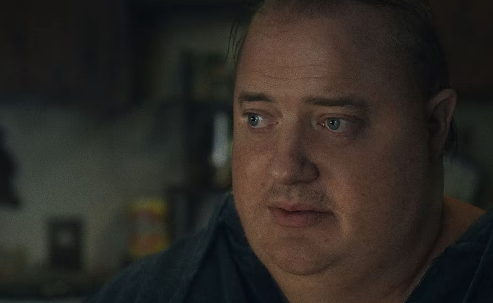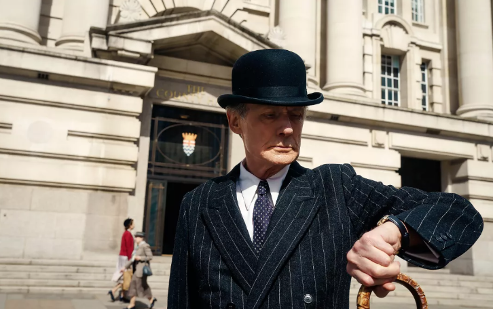The Whale

Cast: Brendan Fraser, Hong Chau, Sadie Sink, Ty Simpkins
Director: Darren Aronofsky
117 mins.
Like Darren Aronofsky's previous films, the dark drama The Whale doesn't shy away from the troubling realities of the character's situation, but what lingers are its deep wells of gentle vulnerability and contemplation in its exploration of guilt, redemption, grief and trauma. Charlie (Brendan Fraser) teaches English classes online while living with severe obesity. He pretends his laptop camera is broken so that they can't see him and he never leaves his home, orders all his food and receives occasional visits and care from his nurse and friend Liz (Hong Chau). When he learns that his blood pressure is dangerously, lethally high, he refuses to go to the hospital, and instead devotes his energy to reconnecting with his brilliant, estranged, and deeply troubled teenage daughter Ellie (Sadie Sink). Meanwhile, a young religious zealot/missionary, Thomas (Ty Simpkins), happens upon Charlie and decides that he wants to help him to save his soul.
The Whale launches with a shocking, even horrific sequence as Charlie masturbates before being interrupted by crippling chest pains. This initially casts Charlie in a pathetic light, but as the story progresses over the course of a week, the viewer will surely begin to change his/her mind. We gradually become aware of who he really is: loving, intelligent, sensitive, and an undying optimist. In fact, we eventually learn that the title is not a cruel nickname for its hero, but rather a reference to Moby Dick, and a cherished essay that Charlie reads and quotes to himself in times of despair. Fraser's performance is of course astonishingly enhanced by makeup and outstanding prosthetics, but his work is unfailingly powerful. He is required to wheeze and grunt and groan as he drags around his huge bulk, as well as conveying the agony of it all, but his bright eyes gleam with hope. Playing opposite him, Hong Chau is equally superb - and she wins us over by shouting at Charlie, then tickling him.
The screenplay by Samuel D. Hunter and adapted from his play, is filled with fascinating discussions about love, literature, truth and faith - which Aronofsky has previously grappled with in his work, especially in Noah and Mother! His direction is skilled but not showy, closer to The Wrestler than his other films, and focussed mainly on character and performance. The Whale flows beautifully - even if it sometimes feels a little stage-bound – and for a supposed recluse, Charlie is never without someone to talk to. It's a film that will twist any preconceptions, turning a potentially disgusting character into an amazing human being.

Cast: Bill Nighy, Alex Sharp, Barney Fishwick, Tom Burke,
Aimee Lou Wood
Director: Oliver Hermanus
102 mins
As the film Living begins, Mr. Williams learns that he has only a short time of life remaining. The news doesn’t come as a huge shock, but even if it did, nothing about this man — his stiff posture, his calmly appraising gaze or his thin, flat line of a mouth — would offer anything resembling devastation or even surprise. We are in 1950s London, and Mr. Williams, who’s spent more than two decades toiling away in the county hall’s Public Works department, has encased himself in a cloak of propriety, receiving every new document and file with unfailing politeness and unflappable calm. Therefore, why should his response to his own imminent demise, be any different? Mr. Williams is played by the wonderful Bill Nighy, for whom a show of restraint is never just that. Within emotional parameters that other actors might have found gloomily restricting, Nighy coaxes forth a tour de force of understatement, suffused with an almost musical melancholy. His performance is a tremendous minor-key symphony of downcast gazes and softly-spoken pronouncements, lightened occasionally by a faint trace of a smile. There’s a whisper of humour to him, a sense of irony about a death sentence that he keeps secret from all but a trusted few. In the film’s best moments, Nighy lures you into the impression that he’s sharing a private joke with you, a glimmer of comic insight into an unbearably sad situation. I recalled Love Actually, specifically a line from Nighy in that film, “And now I’m left with no one, wrinkled and alone!” But Mr. Williams is not one for flamboyant self-pity, and Living, thankfully, will never be mistaken for “Life Actually.” Exquisitely directed by Oliver Hermanus from a spare, elegant script by the Nobel Prize-winning novelist Kazuo Ishiguro, Living shows bureaucracy transplanted to post-war London and visualised as a sea of grey pinstripe suits and bowler hats, flowing through wood-panelled offices and up and down marbled staircases. It’s an almost distractingly beautiful vision of workplace tedium, thanks to the impeccable cut of Sandy Powell’s costumes, the polish of Helen Scott’s production design and the deep colours and sharply planed images of Jamie Ramsay’s cinematography. The initial impression of the place, and of Mr. Williams himself, comes by way of a new Public Works hire, Peter Wakeling (Alex Sharp). His cheery disposition and idealistic spirit are swiftly tempered by the realisation of what their work, if that’s the right word, entails.
The building is a well-ordered monument to inefficiency, where papers are duly stored and shuffled around, and anyone in need of personal assistance is immediately referred to the next department The satire of public administration is down to the series of wipes used here to follow a group of women on their fruitless, frustrating quest to convert a bomb site into a children’s playground. But Ishiguro has also streamlined the material and sanded down some of its rougher edges, in keeping with a sensibility that feels governed by a quintessentially,or stereotypically, English reserve. Bad news is delivered and processed with the stiffest of upper lips. Away Mr. Williams goes from the office where he has never missed a day’s work until now, with barely a word to his colleagues or to his unsuspecting, self-absorbed son (Barney Fishwick) and daughter-in-law (Patsy Ferran). His chance encounter with a worldly pleasure seeker (Tom Burke) is diverting enough, though their guided tour of arcades and nightclubs has been conspicuously denuded of suspense or menace. More affecting are Mr. Williams’ moments with a soon-to-be-former colleague, Margaret Harris (a delightful Aimee Lou Wood), whose warmth and good humour make her an ideal if accidental confidant. Their tender rapport is one of the story’s pleasures — a reminder that the gradual forging of a bond between near-strangers, truthful and unhurried, can be one of the simplest and most powerful things to witness in a film. Their meetings also never rise above a polite simmer, which is true of nearly everything that transpires in “Living,” death included. Nighy forges something mysterious, almost subterranean, from Mr. Williams’ crisis and sudden reawakening. That might make the film sound more anaemic than it plays, as if it were a story about the meaning of life with barely enough life surging through its own veins. But if Living never matches — or tries to match — the grit and density of Kurosawa’s masterpiece, it knows that detachment can be deceptive, that it can conceal profound and resonant depths of feeling. This economy comes to fruition in the third act of Living, which shrewdly restructures the story’s closing scenes with no loss of impact, and with an assertion of its own singular identity. That’s to the good of a picture that knows Mr. Williams’ example is somehow both admirable and inimitable, that the difference between an ordinary life and an extraordinary one can only be measured within a set of specific, unrepeatable circumstances. It’s only human to pretend we would behave as our heroes would, and no less human to long to see and hear their stories retold.